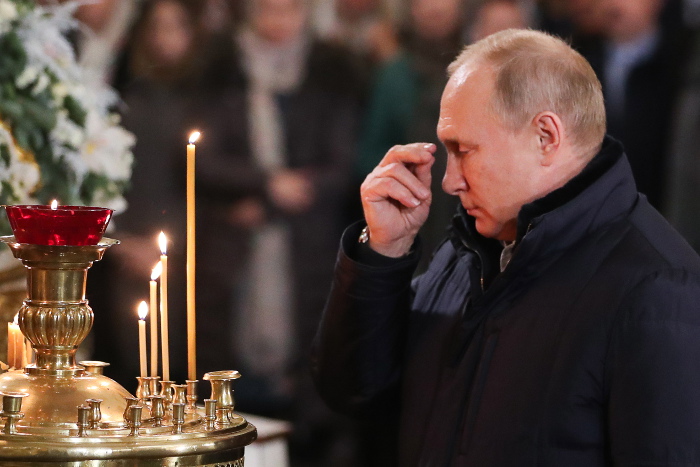The Islamic State militant group (ISIS) is back to capturing international headlines with a spate of deadly high-profile attacks abroad, while also threatening to further expand the reach of its operations by striking at some of the world’s most popular sporting events — in a year that will include the Olympics being held in the heart of Europe.
Over the last decade, the self-proclaimed ISIS caliphate that initially spanned large parts of Iraq and Syria was crushed by separate campaigns waged by local, regional and international forces, including the U.S., Russia and Iran.
But the group has since managed to fortify its presence beyond the Middle East, including in many African nations as well as Afghanistan, home to the particularly active ISIS-Khorasan province, known as ISIS-K.
Though much of the threat posed by the recent ISIS resurgence has been focused on the respective nations in which the group set up base, ISIS-K has increasingly crossed borders in recent months, targeting Pakistan, Turkey and Iran, where the jihadist group claimed its deadliest attack in the 45-year history of the Islamic Republic in January.
Then, last month, ISIS took responsibility for laying siege to a concert hall outside Moscow, killing 145 people and marking the deadliest militant attack in Russia in two decades and the group’s deadliest-ever attack in Europe.
Since the March 22 assault at the Crocus City Hall, ISIS supporters have called for further bloodshed in Russia and elsewhere in Europe. Glossy digital posters published by ISIS-K’s media arm, Al-Azaim, have threatened to attack stadiums hosting the ongoing UEFA Champions League soccer quarterfinals in London, Madrid and Paris.
One poster called for followers “to recreate the glory” of the simultaneous shootings and suicide bombings that ravaged Paris in November 2015, urging similar tactics be carried out at the Parc des Princes, a 50,000-seat football stadium currently hosting the Champions League that will also be used during the upcoming 2024 Summer Olympic Games.
Experts say the calls to action are part of a worrying pattern that, more often than not, leads to real-world violence.
“I’ve seen this trend before,” Lucas Webber, senior consultant at Valens Global and co-founder of the Militant Wire research network, told media. “They set the information space, and they start the criticisms, the threats, they identify the targets, and then every time it seems that they end up striking in the ways they say.”
Regroup, Recruit, Raise Money
While ISIS-K does not command the sprawling territory that the group’s central organization held during its height around a decade ago, it has established a sophisticated network of communications available in a growing number of languages to reach new audiences. One of its most popular publications, released by Al-Azaim, is the Voice of Khurasan magazine.
The cover of the latest edition, published on Monday, bears an image of the Crocus City Hall attack, alongside those of Russian President Vladimir Putin and a wounded bear, with the title “The Bear Bewildered.” The accompanying article hailed the “heroic raid in Moscow, the heart of Crusader Russia” that took place almost five years to the day after ISIS made a last stand in Al-Baghouz, Syria.
“This time, it is not the Muslims but the Christians who are being held accountable for their atrocities and barbarities,” the article read. “This truly is the debt they owe. This debt is so great that many other infidel and Crusader countries will soon pay it, Insha’Allah.”
A separate article asserted that “we renew and reiterate our incitement to the lone lions, to make efforts to target the Crusaders and Jews everywhere.”
The magazine’s final page carried an ominous warning: an image of an armed fighter superimposed inside of a bus rigged with explosives, alongside the phrases “Welcome to Europe” and “Last Call Before Exit.”
The increasingly steady stream of warnings directed at Europe, particularly the specific Champions League threat, has not gone unnoticed.
“We are working closely with security and policing partners in response to despicable propaganda related to the Champions League, to ensure secure and enjoyable events for everyone,” U.K. Home Secretary James Cleverly said in a statement shared with Newsweek. “We will continue to take all steps to keep fans safe.”
A spokesperson for UEFA, European soccer’s governing body that oversees the Champions League, told Newsweek that it is “aware of alleged terrorist threats made towards this week’s UEFA Champions League matches and is closely liaising with the authorities at the respective venues.” The spokesperson further stated that “all matches are planned to go ahead as scheduled with appropriate security arrangements in place.”
Newsweek has also reached to the International Olympic Committee, the French Embassy to the United States, the Spanish Interior Ministry and the U.S. Department of Homeland Security for comment.
Other notable inclusions in the latest ISIS-K magazine were detailed cybersecurity tips and an appeal for donations via Monero cryptocurrency. Such hard-to-trace blockchain platforms, amplified by a savvy marketing strategy, have allowed the group to attract fighters and funds from across the globe in ways that weren’t technically feasible until somewhat recently.
“Each ethno-linguistic group has its own media branch and their own fundraising methods,” Webber said. “The expansion of the media apparatus into more languages has allowed them to reach and recruit and fundraise from a broader range of target audience segments.”
All of this, he pointed out, is “interconnected and all consequences of this kind of internationalized scope in terms of its propaganda, its in-theater attacks on foreign nationals and interests and now it’s rapidly accelerating external operations capacity.”
ISIS-K has thus excelled in presenting itself as both a unifying non-sectarian force and a champion of various ethno-religious causes across Asia, where the group has won support among disaffected communities hailing from the likes of Afghanistan, China, India, Iran, Pakistan, Tajikistan, Uzbekistan and beyond.
Once widely viewed as little more than a remnant of a declining ISIS, Webber argued that the Khorasan branch now leading the call to attack the West is “producing propaganda ads in more languages than any other brand since the height of the caliphate in Iraq and Syria.”
European officials have already beefed up security at the ongoing Champions League matches and other large gatherings in response to the threats issued by ISIS-K. Such attacks have traditionally come in the form of armed assaults and suicide bombings.
But another kind of threat being advertised by ISIS-K is one posed by relatively cheap, commercially available and easy-to-pilot drones. Such unmanned aerial vehicles can be fitted with various kinds of explosives or other deadly materials and have been increasingly put to use on battlefields from the Middle East to the Caucasus and, more recently, Eastern Europe.
“When you see so many videos from Ukraine, from Syria, anyone with a bit of a technical understanding could certainly learn from those videos, pick stuff up and begin to develop their own experience of using those drones,” Alec Bertina, a researcher and Militant Wire contributor, told Newsweek, “and also observing and sort of learning from what other groups have done.”
Such threats have for years haunted security officials across the globe, with governments increasingly investing in anti-drone capabilities. But, as Bertina warned, these countermeasures “are not exactly foolproof.”
“There is always a sort of separation between what governments are aware of and versus what they can actually do,” he said.
Bertina also noted how the proliferation of drone-building technology among ISIS supporters abroad constitutes a “massive concern” as “it only takes on person with competence to basically do what groups have referred to as open-source warfare, which is put together manuals, put together instructions on how to do stuff.”
U.K. counterterrorism authorities apprehended one such person last year, who was found guilty of building a drone “specifically to transport an explosive or chemical weapon into enemy territory for ISIS.”
U.S. intelligence documents that were part of a massive leak released on Discord last year revealed that ISIS went through considerable lengths to seek chemical weapons and drone-operating expertise, as reported by The Washington Post. The trove of leaks unveiled several thwarted ISIS plots to attack the 2022 FIFA World Cup in Qatar, a finding also featured in an August 2023 report by the Combating Terrorism Center of the United States Military Academy at West Point.
Bertina warned that the latest ISIS-K campaign directed toward sporting events displayed a troubling level of specificity and sophistication.
“In these posters that we looked at, what makes me really concerned is that they give really interesting instructions of how to conduct a combined attack,” the analyst said. “ISKP was advising individuals to create a diversion with the detonation of IEDs in one location of a stadium to make another part of it more vulnerable.”
“This is the sort of stuff that should scare people,” he added.








